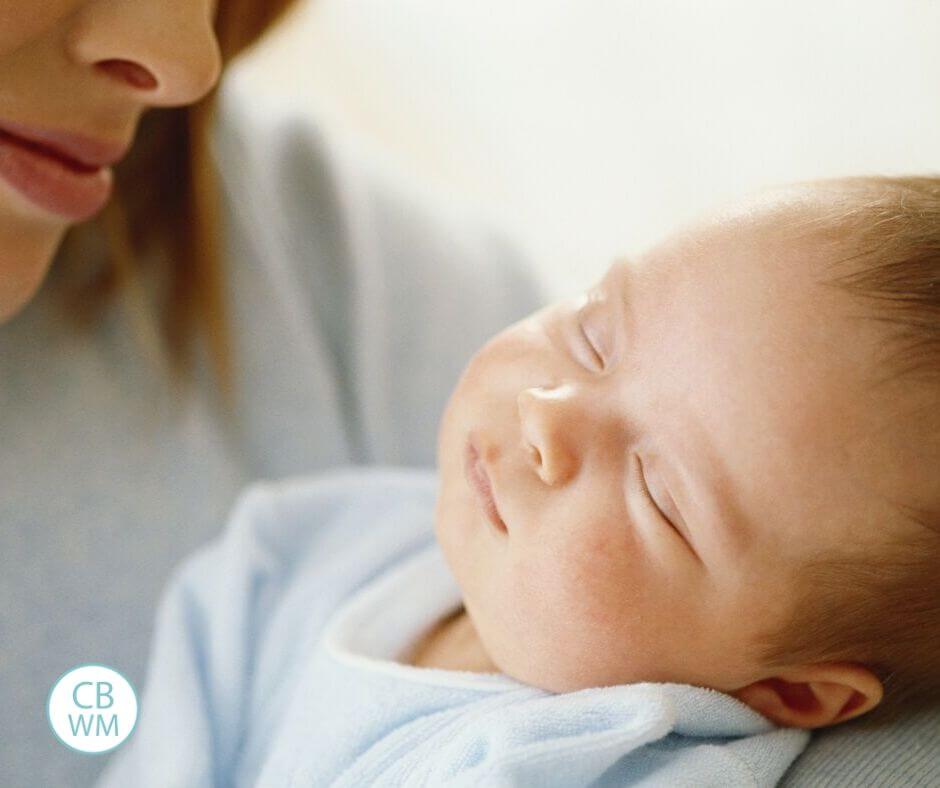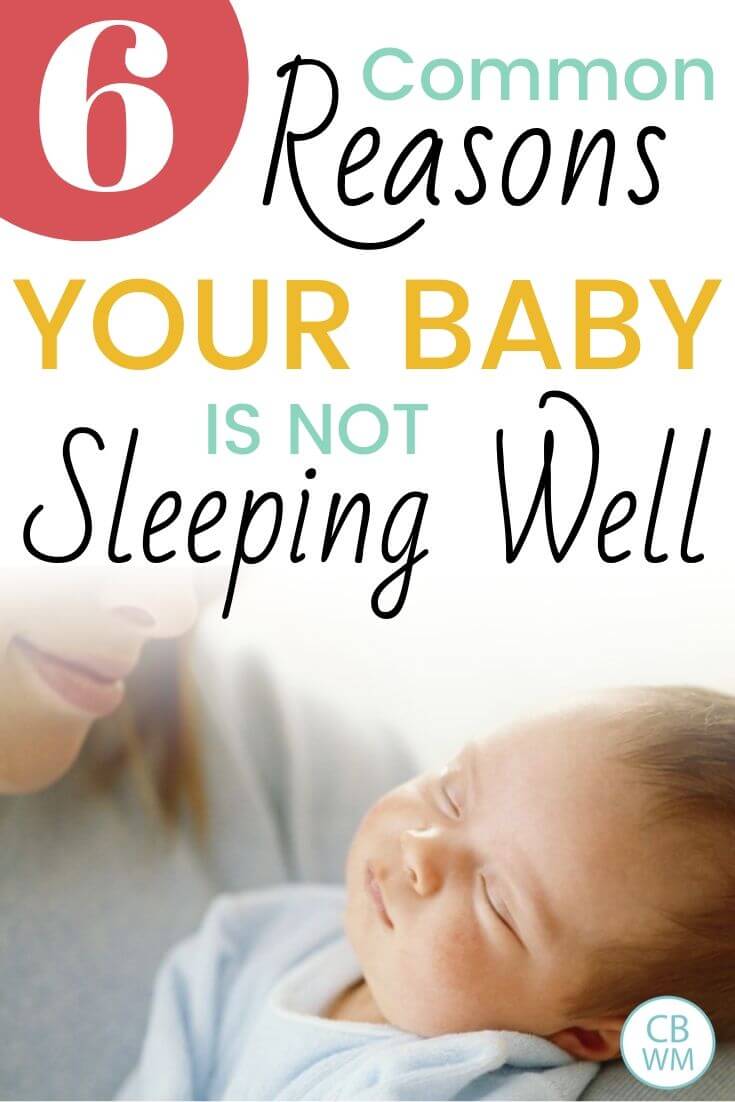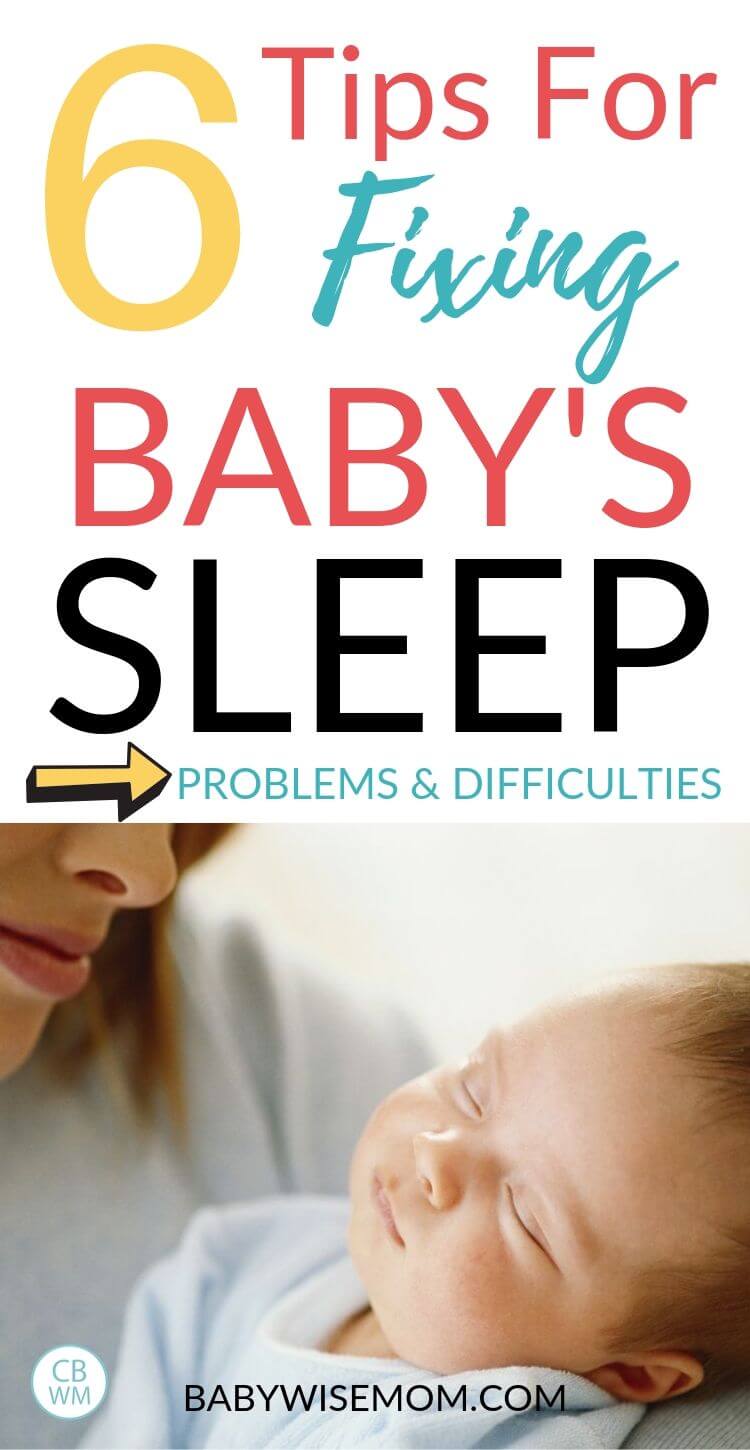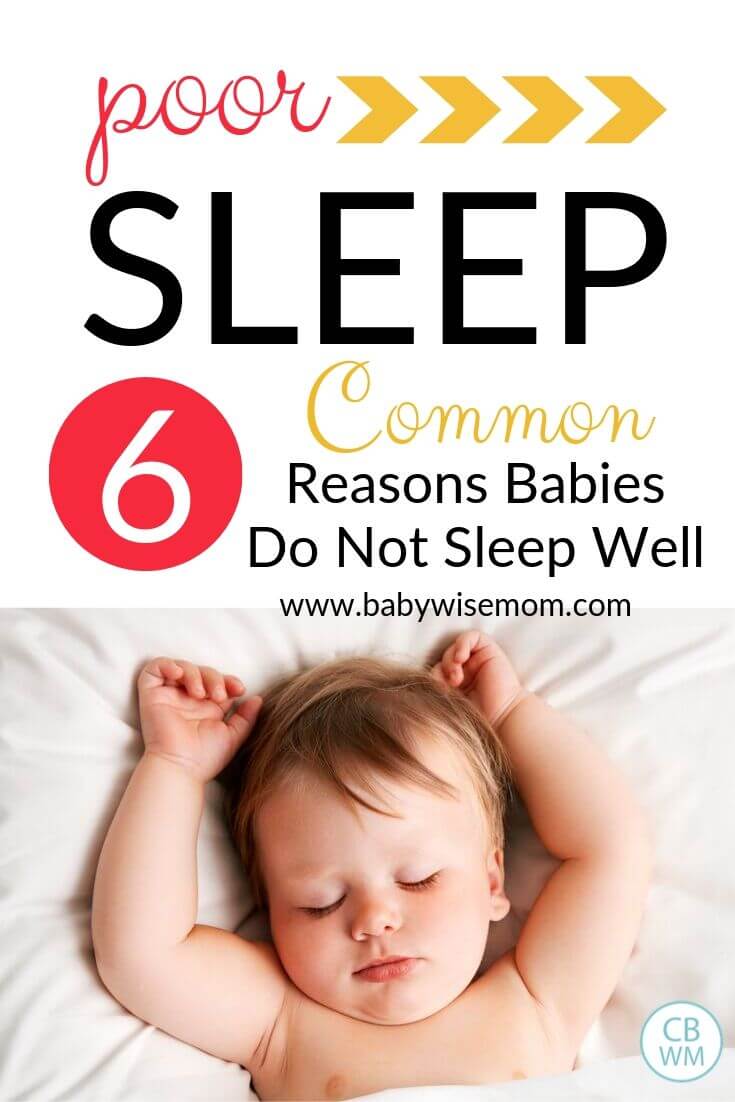Are you wondering why your baby isn’t sleeping well? Check this list of 6 common reasons for poor baby sleep for help troubleshooting.

Whether your baby has never really slept well or was sleeping well and isn’t anymore, you are probably feeling very anxious to help your baby sleep.
If your baby is not sleeping well, consider these 6 reasons as to why. Find the description of the poor sleep behavior of your baby and discover the reason for the poor sleep!
Post Contents
Reasons Baby Isn’t Sleeping Well
In the Baby Whisperer Solves All Your Problems, Tracy Hogg lists six variables to consider when troubleshooting sleep issues.
LACK OF ROUTINE
Are any of these true of your baby:
- Baby doesn’t fall asleep easily
- Baby wakes up every hour at night
- Baby sleeps well in the day but is up all night
If so, you might be suffering from a lack of a well-established routine. You want to feed, play, then sleep. You want this to be about every three hours (though be sure to adjust for growth spurts, age, and baby’s hunger patterns).
You don’t want to let baby sleep too long for naps–if baby sleeps all day, then, of course, she will be up often in the night. You also don’t want baby not sleeping long enough in the day. Sleep begets sleep.
You want to be sure baby is staying awake for feedings.
You also need to respect baby’s needs and not haul (or schlepp as Hogg puts it) your baby around with you everywhere throughout each day. “Consistency is vital” (page 179). Also, keep track of your baby’s eating and sleeping patterns so you can know your routine well. See pages 176-180 for more on these topics.
Read: Tricks for Getting Baby on a Consistent Schedule
INADEQUATE SLEEP RITUAL
Are either of these statements true of your baby:
- Baby doesn’t fall asleep easily
- Baby falls alseep, but is then awake 10-30 minutes later
Hogg says falling asleep is not an event, but a journey.
You have to make it as easy as possible for her to fall asleep. Your baby has a sleep window (just like adults) of when she will fall asleep the easiest. When you recognize your baby’s sleep cues, you need to act on it immediately.
This is especially true for the newborn. For your newborn, a one minute window might be all you have. You need to be ultra observant of your newborn while you try to figure her out.
I know, it isn’t convenient, but just look at the positive. Enjoy staring at her 🙂 She isn’t awake very long anyway. Take notes of what sleep cues you saw and what happened. Did baby fall asleep well? Did she stay asleep well? If so, stick with that waketime length and those cues. If not, keep trying!
Get a copy of my Book of Logs here to help track everything.
Help your baby transition to sleep mode. You can’t take her from playing to sleeping in 30 seconds and expect her to fall right asleep. Have a naptime routine. Rock, sing, cuddle…do what you like, but make it consistent. Keep it short (Hogg says under 15 minutes for under age 3 months. I kept mine to less than 5 minutes).
Use Hogg’s 4 S’s if you are interested in gentle sleep training (I had great luck with this with McKenna and Brinley).
See pages 181-186 for more on this.
Read: Gentle Sleep Training: The Four S’s

ACCIDENTAL PARENTING
Are any of the following true for your baby:
- Baby won’t sleep unless I…(rock, feed, put in swing…)
- Baby seems tired, but as soon as I put her down, she cries
- Baby wakes up habitually at night
- Baby eats at night, but not much
- Baby won’t sleep longer than 30-45 minutes
- Baby wakes at 5AM to start the day
- Baby won’t sleep in her own crib
- Baby wakes when the pacifier falls out
Accidental parenting is the opposite of PC Parenting (Baby Whisperer: P.C. Parent ). With accidental parenting, you are looking for a quick fix. You do what is easiest at the moment without considering the long term effects.
Read: Common Parenting Mistakes that Cause Sleep Problems
You want to avoid sleep props. A prop is anything your baby doesn’t control that she needs to fall asleep. Keep in mind that prop and a comfort item are not the same thing. A blanket or a stuffed animal that the child attaches herself to are comfort items, not props.
Read: When Sleep Props are Oka (and when to avoid them)
The pacifier is something that can become a prop. If your baby wakes as soon as it falls out, it is a prop for her. If she can stay asleep without it in her mouth, then it isn’t a problem.
You also want to avoid rushing into your baby. This doesn’t mean you ignore needs. It means you give her a chance to resettle.
Newborns are very noisy sleepers. They cry out often during sleep transitions. Be sure you know that baby is in need and not transition before you react. This can be hard during the night because you can often react before you are even fully awake 🙂 I find waiting for ten minutes before going in to be very effective and baby will often go back to sleep in that ten-minute window.
Read: The Problem with Credit Card Parenting
You also don’t want to take baby to bed or play with her in the middle of the night. One of my best friends once told me that when her oldest was 13 months old, she (baby) was sick and mom was pregnant.
Her husband was out of town. There was a bad thunderstorm one night. My friend was so tired that she brought her baby to bed with her.
She told me it was a huge mistake. She said not only did she not sleep well that night (because her daughter kept kicking her), but for two weeks, she had to work to get her daughter to happily sleep in her bed again.
She warned me that it was not worth it. One night of bad sleep would have been better than 14.
Be intentional with your parenting.
For more about accidental parenting, see pages 187-195.

HUNGER
Are any of the following true for your baby:
- Baby wakes crying and takes a full feed
- Baby can’t sleep more than 3-4 hours straight at night
- Baby was sleeping longer, but has suddenly started waking
If your child is waking in the night due to hunger, you don’t necessarily need to ride it out. That does not mean that you leave baby to be hungry. It means you can do things in the day to try to get more food in her in hopes she will make it longer through the night.
One method is to try is cluster feeding, which is basically feeding every two hours in the evening before bed.
Another method is the dreamfeed, which is a feeding between 10-11 PM. An important thing to be sure of is that you are getting enough feedings in the day. You want to be feeding every 2.5-3 hours for the newborn. If your baby doesn’t get the needed calories in the day, she will request them at night.
If your baby is going through a growth spurt, she might seek more food in the night instead of the day. If this is the case, add a feeding to the day by feeding more often.
For more on hunger, read up on pages 195-200.
OVERSTIMULATION
Are any of the following true for your baby:
- Baby doesn’t fall asleep easily
- Baby wakes frequently and/or sleeps fitfully
- Baby fights his afternoon nap
- Baby falls asleep but jolts awake a few minutes later
- Baby resists naps, and when she does fall asleep, she wakes 40 minutes later
- Baby has something new in life and is suddenly waking in the night
If your baby isn’t getting enough daytime sleep, she won’t sleep well at night. Avoid keeping baby up too long in the day in order to get better sleep at night. While too much sleep in the day can interfere with nighttime sleep, too little will make it so your baby can’t sleep at night.
Read: How To Calm Your Overstimulated Baby
Also, as your baby comes to develop new skills, these will often interfere with sleep. Baby wants to play with her fingers, practice rolling over, or listen to her beautiful voice more than sleep.
Read: How To Stop New Skills from Disrupting Naps and Sleep
For more on overstimulation, see pages 200-204.
DISCOMFORT
Are any of the following true for your baby:
- Baby doesn’t fall asleep easily
- Baby wakes often at night
- Baby falls asleep but wakes within a few minutes
- Baby will only sleep sitting up
- Baby seems tired but cries as soon as she is put down
As you get to know babies better (not just your baby, but babies), you will come to recognize cries of pain quickly. They are pretty universal. Babies also have common body language. If your baby is in pain, he will grimace, his body will go rigid, and he might flail his limbs. His cry will be shrill and high pitched. Be sure your baby does not have gas or Reflux.
Read: What To Do If Your Baby Has Gas
Also, your baby can cry because she is too cold or too hot. She might be one who dislikes having a wet diaper, or she might be poopy (there are things you can do about a baby who poops in the night).
See pages 204-207 for more on baby discomfort.

CONCLUSION
There are always so many variables to consider when baby is waking early from naps or waking in the night. Without fail, any time my baby is waking suddenly, I can think of at least five possible reasons for the waking. You have to work your way through the possible reasons until you find the one.
When baby wakes early, deal with more vital issues first. It is always wise to treat early waking as a hunger issue first. This is because you don’t want to spend a week running through other fixes if baby is actually simply hungry. Feed hungry babies.
If it is pain, there is nothing you can do to train your child to not be in pain. You need to find some way to relieve the pain.
So as you troubleshoot, run through the more critical possibilities first, then move on to less important ones. For example, make sure your baby isn’t hungry, in pain, or uncomfortable before assuming baby simply isn’t sleeping because she enjoys her newfound skill of crawling.

RELATED SLEEP POSTS
- Optimal Waketime Lengths
- The Problem with Credit Card Parenting
- An Easy Short Nap Fix that Works
- How To Manage Baby’s Dreaded Witching Hour
- 5 Ways Season Changes Disrupt Your Child’s Sleep
- The Wonder Weeks and Sleep

